Best Practice Sharing Covid-19. How to tackle COVID Safe Risk Assessments.
- Representation Plus

- Sep 1, 2020
- 2 min read
Updated: Oct 22, 2020
In this edition of Micebook Talks, Chetan Shah was joined by Sarah Threlfall, Events & Safety Consultant at BrightSpace Events Ltd and Laura Capell-Abra, Founder of Stress Matters. Now that everyone can finally start looking towards some form of live events starting in October, the next step is making sure that they are safe and here is what we have taken away from the session.
Nothing has changed drastically over the past few weeks with business events still allowed to take place from 01 October on the basis that the infection rate does not increase. These will have a limit of 30 people for inside venues and no limits for outdoor venues.
Risk assessments in general are a legal health & safety requirement for all events and the COVID safe risk assessment is no different. The assessment will need to form a real part of event planning and be taken into account from the very beginning of the process. It should also be part of every check-point/update along the way so that stakeholders can add to it if need be.
There are no official guidelines or stamp of approval from the governing bodies. Each COVID safe risk assessment will be bespoke and open to interpretation. That said, it should follow the same principles as any other risk assessment:
Identify the hazards
Assess the likelihood of the hazards happening
Establish how to prevent/deal with the hazards should they materialise
The main focus of a COVID safe risk assessment is on the cleaning processes and social distancing measures implemented for each step of the event’s programme.
The main difference between a generic risk assessment and a COVID safe risk assessment is a much bigger emphasis on the staff, how they can keep safe and not contribute to spreading the virus amongst themselves and to the delegates.
There will be many events organisers and delegates feeling anxious returning to live events and the COVID risk assessment should help in boosting their confidence.
Wellbeing corners will be encouraged going forward and so will quiet rooms for people to “reset” if need be.
The assessment also needs to take into consideration that some key people/speakers may be required to quarantine at the last minute and therefore no longer able to attend the event. This self-isolation impact should therefore be part of the overall COVID safe risk assessment.
To listen to the full podcast click here
The WTTC Safe Travel Stamp may assist in putting together covid safe assessments or assessing partner protocols.
Please leave some feedback in the comment section below.










